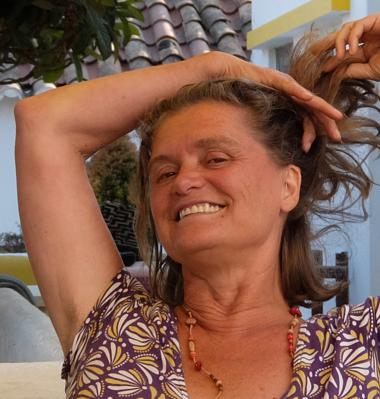Thursday, 16th April 2020
by Leila Dregger
Easter is already over and I notice it’s not just me who’s starting to become more nervous. It’s the same for my friends. Yesterday I received the news that a young man I know had attempted suicide – on Easter Sunday! Thank God, he has survived. His girlfriend said he had been overcome by negative forces.
No wonder, in times like these. We’ve had enough, don’t you think? They kept saying we would have to wait until Easter. In our subconscious, we might have been expecting a kind of resurrection, an easing of the situation, good news, anything. But no. Once again, the state of emergency was extended. The coronavirus’s “crown of thorns” continues.
 Contrary to the news reports from other countries, where measures against the virus are being forcibly imposed by the authorities, we in Portugal are in a privileged situation. Democracy and human rights are still respected. But, at the same time, we have to deal with ourselves. We have to admit that part of the restlessness that is overtaking us is due to fear. There are those who are afraid of being infected by the virus and those who fear that the measures taken and the restrictions placed on our civil liberties may take root and become established, as well as many who fear economic collapse. And there are also many who are afraid to get into a state of panic because they might no longer be able to stand the constant close proximity of their partners, their children, their family. Others fear loneliness. What most frightens me is those who claim not to be afraid at all.
Contrary to the news reports from other countries, where measures against the virus are being forcibly imposed by the authorities, we in Portugal are in a privileged situation. Democracy and human rights are still respected. But, at the same time, we have to deal with ourselves. We have to admit that part of the restlessness that is overtaking us is due to fear. There are those who are afraid of being infected by the virus and those who fear that the measures taken and the restrictions placed on our civil liberties may take root and become established, as well as many who fear economic collapse. And there are also many who are afraid to get into a state of panic because they might no longer be able to stand the constant close proximity of their partners, their children, their family. Others fear loneliness. What most frightens me is those who claim not to be afraid at all.
Fear is part of our lives – not just in times of virus. Except that, on a day-to-day basis, we are normally distracted by consumerism, professional activity, travel, etc. How many times have I withdrawn and hidden away because the situation was becoming unbearable! I went to look at the sea, to the cinema, or hid behind my obligation to write one, two or three more articles.
Fear is considered a weakness. But, in reality, it’s a systemic feature of our capitalist society. It forms the core of the personality that is addicted to profit and obsessed with growth: it’s the fear of deprivation that makes us accumulate property and maximise profits. It’s out of fear of weakness that we fight others. It’s out of fear of being abandoned that we turn our relationships into prisons. It’s the fear of plagues that makes us poison our gardens. And it’s the fear of enemies that makes us start wars. I am absolutely sure that the fear virus kills more people than any other virus. Fear is dangerous. Mainly when it begins by being unconscious, and then becomes felt and is overvalued.
We have to diminish our fears. And, for this, we need peace of mind, knowledge, good friends and a lot of strength. Where does this strength come from? My recipe against fear is to be there for others. To serve and to help someone, even if it’s a simple task. Waking up in the morning and making coffee for everyone. Having time for someone I haven’t spoken to in a long time. And this is where the great advantage of community life lies: there is always someone who needs help. Someone for whom we can be the person they need at that moment. Genuine empathy is a powerful antidote for fear. In a way, there is a little bit of a “resurrection”.
 Eco123 Revista da Economia e Ecologia
Eco123 Revista da Economia e Ecologia


